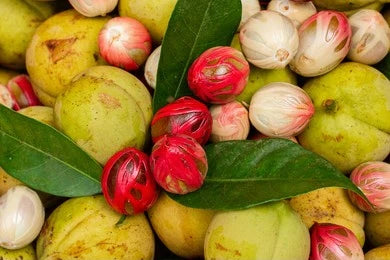Jatiphala (Myristica fragrans) is a tiny aromatic evergreen tree that can grow to a height of 5-13m. Jatiphala is an egg-shaped seed derived from the fruit of Myristica fragrans.
The leaves of the Jaiphal Plant are smooth and dark green, with a shining upper surface. They are 7.5-8.8 cm long and placed alternately. Jaiphal blooms are small and pale yellow, and they are normally single-sexed. Jaiphal fruits are small, fragrant, smooth, and oval in shape. They have a brownish shiny appearance. It has a hard coating that encloses mace, as well as the outer covering on the nutmeg seed (Jaiphal). When the fruit ripens, it bifurcates, revealing a reddish dry lacy covering of nutmeg. Mace (Javitri in Hindi) is the orange-yellow papery material that separates from the seed after drying.
General Definition
Jatiphala or Jaiphal's botanical name is Myristica fragrans, sometimes known as nutmeg, and it has been shown to offer numerous health advantages. It is an important herb in Ayurveda. It is an aromatic spreading plant that contains a variety of oils, proteins, starch, minerals, and resins. It has digestive, appetizer, aromatic, and astringent properties. According to Ayurveda, it has anti-inflammatory, anti-diarrheal, analgesic, and kamottejak and shukrastambhak (sex stimulant and avoiding premature ejaculation) properties.
The main components of jatiphala include a fixed oil, volatile oil (3%), d-pinene, myristin, myristic acid and its ester, myristicin, fatty acids, and so on. Mesin is an element found in Jatiphala. Volatile oil, dehydrodisoeugenol, licarin -B, and three additional neolignans are also present in the aril. Camphene, engenol, isoeugenol, elemicin, limonene, myristicin, pinenes, safrole, terpineol, and terpine are all derived from oil.
Classification
Kingdom: Plantae
Subkingdom: Tracheobionta
Superdivision: Spermatophyta
Division: Magnoliophyta
Class: Magnoliopsida
Subclass: Magnoliidae
Order: Magnoliales
Family: Myristicaceae
Genus: Myristica
Species: Fragrans
Kingdom: Plantae
Habitat
The Jatiphala plant is native to Indonesia's Banda Islands. It's also grown in Grenada, India, Malaysia, the West Indies, and Sri Lanka. The tree is found in over 72 different species in India, Sri Lanka, Malaysia, and North Eastern Australia. It is found in Madras State, India (Nilgiris, Coimbatore, Salem, Ramanathapuram, Tirunelveli, Kanyakumari, and Madurai districts). Some Jaiphal trees can also be found in places like Kerala, Assam, and other states.
Alternative Names
Hindi Name - Jaiphal
Sanskrit Name - Jatiphala, Jatiphalam, Jayapatri, Javitri, Jatikosha, Jatipatri, Jatipatra, Jaiphal
English Name - Nutmeg
Punjabi Name - Jaiphal
Urdu Name - Jauzbuwa, Jaiphal
Assamese Name - Jaiphal, Kanivish
Telugu Name - Jaji Kaya
Tamil Name - Jatikkai, Sathiccupi, Jadhikai, Jadhiccupi.
Bengali Name – Jaiphal & Javitri
Kannada Name - Jaikai
Malayalam Name - Jathikai
Marathi and Gujarati Name – Jaipal
Arabic Name - Jeeyansibe
Ayurvedic Properties
|
Particular |
Hindi / Sanskrit |
English |
|
Rasa (Taste) |
Tikta, Katu |
Bitter, Pungent |
|
Guna (Physical Property) |
Laghu, Teekshna |
Light, Strong |
|
Virya (Potency) |
Ushna |
Hot |
|
Vipaka (Post-Digestive Taste) |
Katu |
Pungent |
Effects on Doshas
It balances Kapha and Vata Dosha.
Practical Uses
Jatiphala is a useful herb because of its medicinal properties, which include aphrodisiac, abortifacient, analgesic, expectorant, antibacterial, anticancer, anti-inflammatory, antiseptic, aarminative, digestive, emmenagogue, hypocholesterolemic, hallucinogen, narcotic, and stimulant.
- Jaiphal can help stimulate sexual desire.
- It has the potential to cause abortion.
- It has the ability to alleviate discomfort.
- An antibacterial agent as well.
- Jatiphala is also used to treat and prevent cancer.
- It contains anti-inflammatory properties and can help to reduce inflammation in the body.
- It has a digestive effect by preventing the production or causing the ejection of gas.
- This plant stimulates sputum secretion by the airways, which aids in cough therapy.
- A good herbal ingredient for stimulating or increasing menstrual flow.
- A beneficial herb that can help decrease blood cholesterol levels.
- It can ease pain within a therapeutic dose by numbing the senses and inducing deep sleep.
- The essential oil extracted from Mace is thought to be a powerful brain enhancer. It improves concentration and reduces stress.
- Mace is an excellent liver tonic.
- It has the ability to dissolve kidney stones and protect against infection.
- Jaiphal herb is also beneficial to the heart since it improves blood circulation.
- The anti-inflammatory effects of mace are beneficial in the treatment of joint and muscular problems.
Part Used
Fruit, Seed, Seed coat, Oil
Dosage
- Nutmeg powder (Jatiphala) dosage is 500 mg to 1 gram.
- Mace (Javitri) dosage ranges from 250 mg to 1 gram.

